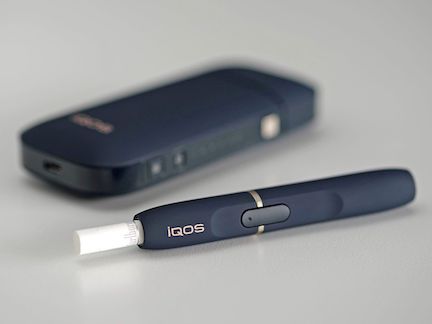Philip Morris International Inc. faces the possibility of having imports of its IQOS heated-tobacco sticks to the U.S. blocked as early as November in an intensifying legal battle with British American Tobacco Plc over cigarette alternatives.
BAT’s subsidiary Reynolds American Inc. seeks to block imports of the sticks as it alleges that the tobacco heating technology used in IQOS devices infringed its patents. The six-day trial at the U.S. International Trade Commission in Washington, D.C. began Monday, with a judge scheduled to release his findings in May.
Tobacco firms are spending billions of dollars to develop smokeless alternatives such as nicotine pouches, e-cigarettes and tobacco-heating devices as fewer people smoke traditional cigarettes. Philip Morris’s IQOS device is the only heat-not-burn product to be authorized for sale in the U.S., where it’s marketed by Altria Group Inc..

The device, where the tobacco is heated enough to create an aerosol but not enough to combust, also got the U.S. Food and Drug Administration’s nod last year to be marketed as reducing consumers’ exposure to harmful chemicals found in cigarettes, giving Philip Morris even more of an edge against competitors.
Pressure is on to develop new markets, as tobacco stocks fell in the past year even as the overall U.S. market surged. Altria dropped 18% and Philip Morris’s U.S. shares were down 2.7% in 2020, while BAT was down 16% in London. The S&P 500, meanwhile, rose 16% during that period.
Reynolds sued in April, with a case in federal court in Alexandria, Virginia, and the complaint at the ITC. Reynolds claims that Philip Morris and Altria copied patented technology that it had developed for its Vuse Vibe and Vuse Solo vaping products.
“Given the significant investment we have made in developing our products, we simply cannot allow competitors to use our patented innovations and technology in their devices,” BAT said by email.
Altria responded with its own patent-infringement claims in the Virginia case, and a separate suit against Reynolds in May. Altria also lodged petitions with the U.S. Patent and Trademark Office challenging the validity of a half-dozen Reynolds’ patents, including the three in the ITC case.
“BAT’s attempt to secure an importation ban against IQOS in the U.S. is part of a broader global strategy meant to undermine the heated-tobacco segment, where they lag far behind, and protect their core cigarette business,” Philip Morris said.
Reynolds and Altria have accused each other of infringing patents for things like the pod assembly, charging case and flavor enhancements. In the ITC case, Reynolds has the support of the trade agency’s staff, which acts as a third party to the case on behalf of the public. Staff lawyer Sarah Sladic, in opening arguments Monday, recommended that the judge find that Altria infringed two patents for a smoking article with a heater that creates an aerosol, but that there was no violation of a third patent, for the control body.
Altria and Philip Morris have argued that, even if a violation is found, IQOS is important in efforts to reduce smoking and shouldn’t be excluded from the U.S. market. Philip Morris has set an aspirational target three years ago that at least 40 million adult smokers worldwide will have stopped smoking and switched to its smoke-free products by 2025.
The commission rarely opts against an import ban after finding a violation, and Sladic said this isn’t the case to make an exception. It’s scheduled to issue a final decision by September and the ban, if ordered then, would take effect in November.
There’s no indication that IQOS will be “robustly adopted” by U.S. consumers, and the FDA has not found that the devices will reduce the harm to the health of smokers, Sladic told the judge. The IQOS products are made in Malaysia, Switzerland and Italy, according to Reynolds’ original complaint.
Reynolds lawyer David Maiorana of Jones Day said Philip Morris has “blown public interest way out of proportion here” and coached groups to submit filings with the agency opposing any import ban on public health grounds.
Studies show that smokers “like and enjoy the experience that IQOS provides, which is very different from e-cigarettes and unlike other reduced-risk alternatives,” Altria and Philip Morris lawyer Max Grant of Latham & Watkins said in opening arguments.
While Administrative Law Judge Clark Cheney isn’t bound by the staff’s recommendations, they can be persuasive to both the judge and the commissioners who will make the final decision.
The IQOS device is critical to Philip Morris’ commercial strategy, which is focused on disrupting combustible tobacco, according to Nico von Stackelberg, founder at Inevitable Capital Partners, a strategy consulting firm.
“It’s one of Philip Morris’ most promising bets on a highly-profitable next-generation future,” he said. “The two parties may settle their respective court cases and Philip Morris may agree to license BAT’s patents.”
The cases are In the Matter of Certain Tobacco Heating Articles, 337-1199, U.S. International Trade Commission (Washington); RAI Strategic Holdings Inc. v. Altria Client Services LLC, 20-393, U.S. District Court for the Eastern District of Virginia (Alexandria); and Altria Client Services v. R.J. Reynolds Vapor Co., 20-472, U.S. District Court for the Middle District off North Carolina (Greensboro).








